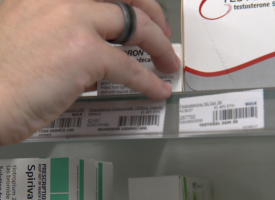AMA Transcript - MBS Review Taskforce
Transcript: AMA President A/Prof Brian Owler, Doorstop, AMA NSW, 22 April 2015
Subject: MBS Review Taskforce
QUESTION: So Dr Owler, the Government has announced this multiple review into the Medicare system; do you welcome what they've done?
BRIAN OWLER: Well, certainly, welcome the announcement by Minister Ley this morning that there is going to be a review of the MBS. We know that the schedule is somewhat outdated, we know that there are procedures there that are no longer performed. But there are many procedures that really should be added to the schedule as well. So I think what we need to see is a constructive process. We're glad that it's clinician led, we have confidence in the clinicians that have been appointed, and we'll be looking forward to working with those clinicians, but also having the speciality societies form part of this process so that they can actually own this review. And I think that's been the downfall of reviews in the past. We've seen reviews that have targeted an amount of saving, we've seen a hit list of savings, and we're glad that this sort of review is not going to be that type of review. It's going to be more about making sure that we have the right schedule that delivers better outcomes for patients.
QUESTION: Is this what the Government should have done right from the word go rather than talking about Medicare co-payments and so forth?
BRIAN OWLER: There's no doubt that we've lost essentially 12 months of policy development because of the debate around the co-payment. And I am glad that Minister Ley has taken the approach of working with the profession to come up with a process that gives, I think, clinicians more confidence that there will be the right outcome. Now, we will be keeping a very close eye on this process to make sure that it doesn't get derailed, that people are not just looking for savings, but rather we actually get the best result for patients. Because I think we need to remember that the schedule is actually about the rebate that the patient receives. It's not about the doctor's income.
QUESTION: Now today, as Minister Ley said, that as far as she is concerned this is not about money. Do you accept her at her word that potentially this is maybe diverting money to areas which most need it, that have been neglected, but the same funding pool will probably remain?
BRIAN OWLER: Well, I know that the Government wants to realise savings, I mean there's no doubt about that and I accept that that's part of their policy. But what we have not signed up to is a process that is purely about savings. Both the Prime Minister and the Minister for Health have said to me that if there is some form of saving from this process that that money should be, at least part, reinvested back into the health system. And as I've said, there are items that should be added to the schedule which reflect modern medical practice, and I think adding many of those newer items will actually allow us to develop a schedule that more closely reflects the practice of modern medicine.
QUESTION: How confident are you that doctors will get back this $1.3 billion rebate?
BRIAN OWLER: I think there is obviously the freeze that is currently in existence. Now, that is a concern. The AMA has outlined the fact that the indexation freeze affects the rebate that patients will receive. For general practice it means that there is going to be less bulk billing and more doctors are going to have to charge out-of-pocket expenses, but also the out of pocket expenses for specialist services are likely to significantly increase, and it's going to put greater pressures on private health insurance premiums as well. So, the rebate freeze has to end. There's no doubt about that. It is quite a destructive process. I think it is going to drive out-of-pocket expenses up. The Minister has said that if some of the savings can be realised then the indexation will be lifted. Now, I don't think we should closely link those two things together, but I think the indexation freeze definitely has to be lifted at some stage soon.
QUESTION: So on that issue, is that what you- is that the Budget measure that you would be expecting, that the indexation is lifted in the Budget rather that wait for the outcome of this review?
BRIAN OWLER: Well, there will be a scoping study, that will be the first part of the review, to actually look at what areas might be, I think, areas for initial review. And as part of that study I expect that there may be some savings that are identified, and if that's the case then we may see the indexation freeze lifted. Now, I'm not sure when that's going to be, the Budget of course is only a few weeks away so I think it will be a surprise to see that in the Budget. But of course there are opportunities right across the year for that process to occur.
QUESTION: Dr Owler, can you just explain some of the areas of waste that you think that can be targeted, and where you think that the review might encourage a bit more efficiencies and money to be spent elsewhere? I assume chronic illness is one area you'd like to see more money spent on?
BRIAN OWLER: Yeah that's right. So, I think there are really two major parts to this review process. One is the review of the schedule, and the other part is the review of the general practice item numbers, including for chronic disease management. Now, as far as the schedule is concerned, I don't want to pre-empt the review by pointing to specific procedures or items that might be targeted; I think there's been a lot of that that's already occurred. But I think that's a process for the profession and those people involved in the review process.
We can look at examples where we've had savings in the past, and the vitamin D testing, which was I think probably an area where they were able to reduce the amount of tests that were performed, did realise significant savings. So, if there are areas where the practice is not, I guess addressing the best interests of the patient, and there's evidence to say that, then there are potential areas for savings.
Now this review may also incorporate some of the decision support, which actually helps clinicians use the tests and procedures more appropriately, and that will also deliver some degree of savings I suspect as well.
QUESTION: And [indistinct] I was just going to add, Dr Owler the other thing is that Sussan Ley did say this morning in her news conference that the co-payment is now completely off the table, there's not going to be any sort of, like, value price signal and all these sorts of words the Government has been using in the past.
BRIAN OWLER: Yep.
QUESTION: I assume that that's something that you would welcome?
BRIAN OWLER: Absolutely. I think the ideas about price signals and the co-payment has really been a very destructive process. I don't think we should go anywhere near that in the future. I think what we need to do is actually build the health policy and the health system that Australians need and deserve, and the best way to do that is to work constructively with the medical profession, with the AMA and other health groups as well, to make sure that we get the best outcomes for our patients.
QUESTION: And, look, this- feel free not to answer this, I was just going to ask with the weather, what sort of impact has there been on doctors in various areas? Have you seen doctors- medical professionals strained in trying to deal with people affected by this deluge?
BRIAN OWLER: Look, I haven't had any specific information come back to me in relation to that, but I know that there are a lot of emergency workers that are out there doing a fantastic job, and I know that there are people that have ended up in emergency departments because of the weather, and I think everyone needs to try and be very careful, particularly on the roads where accidents are likely to occur. But heed the warnings of those in government and those emergency services particularly about flood waters, and not entering any flood water. Because we've all seen the devastating outcomes from that.
QUESTION: Alright. Dr Owler, thank you for your time.
BRIAN OWLER: It's a pleasure.
22 April 2015
CONTACT: John Flannery 02 6270 5477 / 0419 494 761
Odette Visser 02 6270 5412 / 0427 209 753



